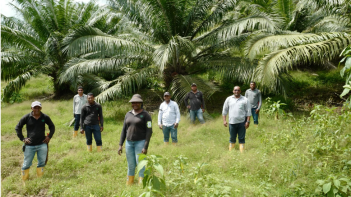Jakarta, 13 August 2020 Consumer representatives called for more sustainable palm oil products with ecolabels to be available in the market as part of the new normal during a virtual talk show, “Adaptasi Kebiasaan Baru: 'Sustainable Palm Oil' untuk Bumi dan Manusia yang Sehat”, co-hosted by the Good Growth Partnership (GGP), the Roundtable on Sustainable Palm Oil (RSPO), and Super Indo today.
Palm oil is well known for its versatility of use in various consumer products including cooking oil, snacks, shampoo, cosmetics and home care products. It is also so widely used due to its high yield efficiency compared to other vegetable oils. However, unsustainable oil palm cultivation practices have caused numerous environmental and social problems that sparked a call for change into sustainable practices to be implemented from both upstream to downstream stakeholders.
“Indonesia is perceived as one of the contributors to carbon emission, mostly due to deforestation that derives from land conversions of forests to plantations, excessive use of peatlands, and peatlands fire. Land-clearing using slash and burn methods, especially on peatlands, causes peat fires that contributed significantly to carbon release, as reported in the 2019 CAMS. Implementation of sustainable agricultural practices, which includes zero burning policies, preservation of peatlands and natural forests, and increasing productivity through intensification will allow continuity of commodity production while maintaining the ecosystem’s health and sustainability,” said Bambang Hero Saharjo, Professor Doctorate of IPB University’s Faculty of Forestry and Environment.
The talk show demonstrated a rising public demand for sustainable products, as its positive impact for improving people’s livelihoods and protecting the environment are becoming more well-known among Indonesian consumers, as well as a global audience. In fact, a recent study conducted by MarkPlus confirms that 82% of respondents expressed their willingness to change their daily palm oil-based products with products that use sustainable palm oil wherever an option is available. However, while sustainable palm oil products are available, it remains hard for consumers to identify them, as the use of ecolabels on products remains very limited.
“Until such time as sustainable palm oil becomes ‘the norm’, consumers should be given a choice to understand that there are different ways in which palm oil can be produced. Labeling products that contain Certified Sustainable Palm Oil (CSPO) and the use of the RSPO Trademark provides a clear indication on which products allows consumers to easily identify ‘good’ palm oil. This is why RSPO is committed to engaging with all stakeholders to make sustainable palm oil products known and accessible, not only to consumers in Indonesia, but across the world” said Imam A. El Marzuq, Senior Manager Global Community Outreach & Engagement RSPO.
COVID-19 pandemic has brought challenges that push both consumers and producers to change old habits and make decisions with positive impacts towards society. “We see that the COVID-19 pandemic has brought lessons and encouraged people to rethink the way they live and consume, giving a renewed drive towards sustainable consumption, including the use of palm oil and sustainable palm oil. Producers then should really ensure that its supply chain thoroughly implements sustainability principles, abiding the rules and regulations, and start providing sustainable products that consumers can identify. Consumers should be more critical and begin to prioritize purchases of sustainable and environment-friendly products,” explained Edi Sutrisno, Director of Transformasi untuk Keadilan Indonesia.
PT. Lion Super Indo is one of the market players that will progress further on its sustainability journey to include sustainable palm oil sourcing for its product. “As one of the top supermarket brands in Indonesia, Super Indo continues to innovate and develop products, answering consumers’ demands for sustainable products. We are observing that consumer demand for sustainable palm oil products is increasing, and we are working to provide soon a line of cooking oil products with an ecolabel, showing our commitment to meet this growing demand and to support sustainable consumption in the new normal,” added D. Yuvlinda Susanta, Head of Corporate Affairs & Sustainability, PT Lion Super Indo.
The talk show was held as part of the ‘Beli Yang Baik’ movement, which aims to increase awareness and understanding toward sustainable consumption through public education and engagement. The movement extends to several commodities, including palm oil, timber, wood, seafood and energy. To encourage the consumption of sustainable palm oil, Beli Yang Baik focuses on mainstreaming knowledge and understanding about palm oil production and consumption.
About the Good Growth Partnership
Working across production, financing, and demand, the Good Growth Partnership convenes a wide range of stakeholders and initiatives to reduce deforestation and enable sustainable development in three global commodity supply chains: soy, beef, and palm oil.
Launched at the United Nations New York headquarters in 2017, the Partnership is funded by the Global Environment Facility, led by the United Nations Development Programme and implemented in collaboration with Conservation International, the International Finance Corporation, UN Environment, and World Wildlife Fund. In partnership with the governments of Brazil, Indonesia, Liberia and Paraguay, as well as civil society and major private sector players, together we aim to place sustainability at the heart of commodity supply chains.
Learn more about the Partnership at www.goodgrowthpartnership.com
About the Roundtable on Sustainable Palm Oil
The Roundtable on Sustainable Palm Oil (RSPO) was formed in 2004 with the objective of promoting the growth and use of sustainable oil palm products through credible global standards and engagement of stakeholders. RSPO is a not-for-profit, international, membership organisation that unites stakeholders from the different sectors of the palm oil industry including oil palm producers, palm oil processors or traders, consumer goods manufacturers, retailers, banks and investors, environmental or nature conservation NGOs, and social or developmental NGOs.
This multi-stakeholder representation is mirrored in the governance structure of RSPO such that seats in the Board of Governors, Steering Committees and Working Groups are fairly allocated to each sector. In this way, RSPO lives out the philosophy of the "roundtable" by giving equal rights to each stakeholder group, facilitating traditionally adversarial stakeholders in working together to reach decisions by consensus, and achieving RSPO’s shared vision of making sustainable palm oil the norm.
The seat of the association is in Zurich, Switzerland, while the secretariat is currently based in Kuala Lumpur with satellite offices in Jakarta (ID), London (UK), Zoetermeer (NL), Beijing (CN) and Bogotá (CO).
About PT Lion Super Indo
Since 1997, Super Indo grows with Indonesia. Now, Super Indo already has 183 stores in 40 cities and regencies in Java and southern part of Sumatera, and six supermarket chains under the Super Indo Express brand in Tangerang, Bekasi, and Depok. Supported by more than 9,000 trained employees, Super Indo provides a variety of daily products with trusted quality, various options, economic price, and easy-to-access store locations. The freshness and the quality of products are being maintained with good sourcing and high standard in product handling. This makes Super Indo the place-of-choice to shop by always being “Fresher”, “Affordable” and “Closer”.
Please reach the following contacts for more information:
On Beli Yang Baik and the Good Growth Partnership
Muhammad David, Deputy Manager, Edelman Indonesia ([email protected] / 081-127-7602)
On the Roundtable on Sustainable Palm Oil (RSPO)
Margareth Naulie Panggabean, Outreach and Engagement Manager-Indonesia RSPO ([email protected] / 021-2506417)
On PT Lion Super Indo
Priyo D. Utomo, Corporate Communications Head PT. Lion Super Indo ([email protected] / 021-2929 33
Keep reading

Access into prisma

Updated Trace Function in prisma

Call for Expression of Interest: Independent Investigation of a Complaint

Latin American Smallholders, Key Global Brands Gather in Peruvian Amazon to Advance Sustainable Palm Oil

RSPO Forum for Members and Certification Bodies 2025: Strengthening Capacities and Building Bridges with RSPO Members

From Violence to Prosperity: Cultivating Sustainable Palm Oil in San Pablo, Colombia

Palmas de Tumaco: Enduring, Trusting, and Transforming in Colombia’s Pacific Coast
Carry Over Credits for Certified Independent Smallholder Groups




